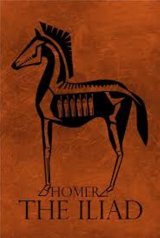Iliad Page #10
The Iliad is an ancient Greek epic poem in dactylic hexameter, traditionally attributed to Homer. Set during the Trojan War, the ten-year siege of the city of Troy (Ilium) by a coalition of Greek states, it tells of the battles and events during the weeks of a quarrel between King Agamemnon and the warrior Achilles.
The sacred offering of the salted cake: When thus the king prefers his solemn prayer; "O thou! whose thunder rends the clouded air, Who in the heaven of heavens hast fixed thy throne, Supreme of gods! unbounded, and alone! Hear! and before the burning sun descends, Before the night her gloomy veil extends, Low in the dust be laid yon hostile spires, Be Priam's palace sunk in Grecian fires. In Hector's breast be plunged this shining sword, And slaughter'd heroes groan around their lord!" Thus prayed the chief: his unavailing prayer Great Jove refused, and toss'd in empty air: The God averse, while yet the fumes arose, Prepared new toils, and doubled woes on woes. Their prayers perform'd the chiefs the rite pursue, The barley sprinkled, and the victim slew. The limbs they sever from the inclosing hide, The thighs, selected to the gods, divide. On these, in double cauls involved with art, The choicest morsels lie from every part, From the cleft wood the crackling flames aspire While the fat victims feed the sacred fire. The thighs thus sacrificed, and entrails dress'd The assistants part, transfix, and roast the rest; Then spread the tables, the repast prepare, Each takes his seat, and each receives his share. Soon as the rage of hunger was suppress'd, The generous Nestor thus the prince address'd. "Now bid thy heralds sound the loud alarms, And call the squadrons sheathed in brazen arms; Now seize the occasion, now the troops survey, And lead to war when heaven directs the way." He said; the monarch issued his commands; Straight the loud heralds call the gathering bands The chiefs inclose their king; the hosts divide, In tribes and nations rank'd on either side. High in the midst the blue-eyed virgin flies; From rank to rank she darts her ardent eyes; The dreadful aegis, Jove's immortal shield, Blazed on her arm, and lighten'd all the field: Round the vast orb a hundred serpents roll'd, Form'd the bright fringe, and seem'd to burn in gold, With this each Grecian's manly breast she warms, Swells their bold hearts, and strings their nervous arms, No more they sigh, inglorious, to return, But breathe revenge, and for the combat burn. As on some mountain, through the lofty grove, The crackling flames ascend, and blaze above; The fires expanding, as the winds arise, Shoot their long beams, and kindle half the skies: So from the polish'd arms, and brazen shields, A gleamy splendour flash'd along the fields. Not less their number than the embodied cranes, Or milk-white swans in Asius' watery plains. That, o'er the windings of Cayster's springs,(97) Stretch their long necks, and clap their rustling wings, Now tower aloft, and course in airy rounds, Now light with noise; with noise the field resounds. Thus numerous and confused, extending wide, The legions crowd Scamander's flowery side;(98) With rushing troops the plains are cover'd o'er, And thundering footsteps shake the sounding shore. Along the river's level meads they stand, Thick as in spring the flowers adorn the land, Or leaves the trees; or thick as insects play, The wandering nation of a summer's day: That, drawn by milky steams, at evening hours, In gather'd swarms surround the rural bowers; From pail to pail with busy murmur run The gilded legions, glittering in the sun. So throng'd, so close, the Grecian squadrons stood In radiant arms, and thirst for Trojan blood. Each leader now his scatter'd force conjoins In close array, and forms the deepening lines. Not with more ease the skilful shepherd-swain Collects his flocks from thousands on the plain. The king of kings, majestically tall, Towers o'er his armies, and outshines them all; Like some proud bull, that round the pastures leads His subject herds, the monarch of the meads, Great as the gods, the exalted chief was seen, His strength like Neptune, and like Mars his mien;(99) Jove o'er his eyes celestial glories spread, And dawning conquest played around his head. Say, virgins, seated round the throne divine, All-knowing goddesses! immortal nine!(100) Since earth's wide regions, heaven's umneasur'd height, And hell's abyss, hide nothing from your sight, (We, wretched mortals! lost in doubts below, But guess by rumour, and but boast we know,) O say what heroes, fired by thirst of fame, Or urged by wrongs, to Troy's destruction came. To count them all, demands a thousand tongues, A throat of brass, and adamantine lungs. Daughters of Jove, assist! inspired by you The mighty labour dauntless I pursue; What crowded armies, from what climes they bring, Their names, their numbers, and their chiefs I sing. THE CATALOGUE OF THE SHIPS.(101) [Illustration: NEPTUNE.] NEPTUNE. The hardy warriors whom Boeotia bred, Penelius, Leitus, Prothoenor, led: With these Arcesilaus and Clonius stand, Equal in arms, and equal in command. These head the troops that rocky Aulis yields, And Eteon's hills, and Hyrie's watery fields, And Schoenos, Scholos, Graea near the main, And Mycalessia's ample piny plain; Those who in Peteon or Ilesion dwell, Or Harma where Apollo's prophet fell; Heleon and Hyle, which the springs o'erflow; And Medeon lofty, and Ocalea low; Or in the meads of Haliartus stray, Or Thespia sacred to the god of day: Onchestus, Neptune's celebrated groves; Copae, and Thisbe, famed for silver doves; For flocks Erythrae, Glissa for the vine; Platea green, and Nysa the divine; And they whom Thebe's well-built walls inclose, Where Myde, Eutresis, Corone, rose; And Arne rich, with purple harvests crown'd; And Anthedon, Boeotia's utmost bound. Full fifty ships they send, and each conveys Twice sixty warriors through the foaming seas.(102) To these succeed Aspledon's martial train, Who plough the spacious Orchomenian plain. Two valiant brothers rule the undaunted throng, Ialmen and Ascalaphus the strong: Sons of Astyoche, the heavenly fair, Whose virgin charms subdued the god of war: (In Actor's court as she retired to rest, The strength of Mars the blushing maid compress'd) Their troops in thirty sable vessels sweep, With equal oars, the hoarse-resounding deep. The Phocians next in forty barks repair; Epistrophus and Schedius head the war: From those rich regions where Cephisus leads His silver current through the flowery meads; From Panopea, Chrysa the divine, Where Anemoria's stately turrets shine, Where Pytho, Daulis, Cyparissus stood, And fair Lilaea views the rising flood. These, ranged in order on the floating tide, Close, on the left, the bold Boeotians' side. Fierce Ajax led the Locrian squadrons on, Ajax the less, Oileus' valiant son; Skill'd to direct the flying dart aright; Swift in pursuit, and active in the fight.
Translation
Translate and read this book in other languages:
Select another language:
- - Select -
- 简体中文 (Chinese - Simplified)
- 繁體中文 (Chinese - Traditional)
- Español (Spanish)
- Esperanto (Esperanto)
- 日本語 (Japanese)
- Português (Portuguese)
- Deutsch (German)
- العربية (Arabic)
- Français (French)
- Русский (Russian)
- ಕನ್ನಡ (Kannada)
- 한국어 (Korean)
- עברית (Hebrew)
- Gaeilge (Irish)
- Українська (Ukrainian)
- اردو (Urdu)
- Magyar (Hungarian)
- मानक हिन्दी (Hindi)
- Indonesia (Indonesian)
- Italiano (Italian)
- தமிழ் (Tamil)
- Türkçe (Turkish)
- తెలుగు (Telugu)
- ภาษาไทย (Thai)
- Tiếng Việt (Vietnamese)
- Čeština (Czech)
- Polski (Polish)
- Bahasa Indonesia (Indonesian)
- Românește (Romanian)
- Nederlands (Dutch)
- Ελληνικά (Greek)
- Latinum (Latin)
- Svenska (Swedish)
- Dansk (Danish)
- Suomi (Finnish)
- فارسی (Persian)
- ייִדיש (Yiddish)
- հայերեն (Armenian)
- Norsk (Norwegian)
- English (English)
Citation
Use the citation below to add this book to your bibliography:
Style:MLAChicagoAPA
"Iliad Books." Literature.com. STANDS4 LLC, 2025. Web. 22 Jan. 2025. <https://www.literature.com/book/iliad_28>.




Discuss this Iliad book with the community:
Report Comment
We're doing our best to make sure our content is useful, accurate and safe.
If by any chance you spot an inappropriate comment while navigating through our website please use this form to let us know, and we'll take care of it shortly.
Attachment
You need to be logged in to favorite.
Log In